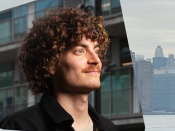Por Diego Rubiera-Garcia (Institute of Astrophysics and Space Sciences, Lisbon University, Portugal).
Abstract: Black holes are one of the most fascinating entities ever found in Nature. For the general public, they are seen as abysmal monsters capable of swallowing anything in their surroundings, no matter whether it is a planet, a star, or an unlucky astronaut. In their origin, they came out as an unavoidable consequence of Einstein's General Relativity more than one century ago, and their existence has been inferred from several observational elements, most notably the recent detection, in 2015, of gravitational waves (another consequence of General Relativity). Such waves are interpreted as resulting from a collision of two black holes. In this talk I will review the elementary properties of black holes as well as those of other fantastic beast emerged from Einstein's "magnum opus", and how we can chase them down in the sky with modern astronomy and astrophysics.
Short Bio: Diego Rubiera-Garcia got his PhD in Theoretical Physics at the University of Oviedo in 2008. He has held postdoctoral positions at Paris-Meudon Observatoire (France), University of Oviedo (Spain) Paraíba Federal University (Brazil) and Fudan University (China), before arriving at the Institute of Astrophysics and Space Sciences at the University of Lisbon in 2015. His passion for black holes and Einstein's General Theory of Relativity has led him to publish dozens of papers on these topics. Moreover, he frequently gives specialized and outreach talks alike to anyone with a bit of curiosity for Science.


















